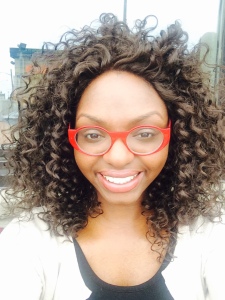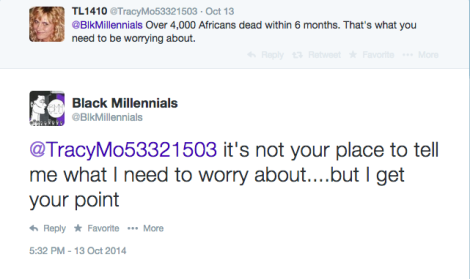In Ferguson, a sizable collective of white allies joined in for mass demonstrations against police brutality. The nature of this burgeoning movement is unapologetically pro-Black; all involved understand that Black and Brown bodies are victimized by state-sanctioned violence.
However, the philosophy of white allyship is fractured. Some white allies grasp the roots of anti-racism more so than others.
Jamie Utt, a white educator and writer for Everyday Feminism, is one who does. In a deeply personal conversation with him, we explored white identity and how it fits into the pro-Black politic. Utt is exceptionally educated in white privilege and structural racism; and while he comprehends the complexities of race relations, he knows that his privilege as a cis-gendered white male is a benefit of longstanding racial tension.
Utt is a fantastic example of how to be a white ally. He educated himself about racism; he does not rely on or expect Black and Brown individuals to garner that knowledge for him. He is open to the Black perspective, and does not hide behind devil’s advocate to mask discomfort. And most importantly, he knows not to invade Black spaces with his white privilege.
Unfortunately, not all white allies are versed or experienced in the ways of white allyship like Jamie is. In Ferguson, I sporadically conversed with “white allies” who, on the surface, believe in justice for Mike Brown and Vonderrit Myers, but underneath, do not connect these incidents within the larger realm of institutional racism.
Hell, some could barely tell me what institutional racism is.
Others tried to divorce themselves from whiteness with blanket statements like “I’m not racist” or “My family isn’t from America.” In these declarations, they thought they were fostering camaraderie or solidarity; when instead they were exposing their ignorance.
White allies are ideal within the pro-Black parameter given their socio-political access to the structures and institutions we are trying to change. With this, I’ve outlined some key factors that white allies should hold to for the socioeconomic advancement of the Black and Brown race.
1. Know what racism is
In basic terms, racism = prejudice + privilege + power
Prejudice is a preconceived feeling, belief, or emotion against a person of a different ethnic, cultural, economic, religious, spiritual, and/or sexual group.
Privilege is an unearned advantage or benefit.
Power is the ability to successfully and methodically exert influence.
Together, these forces compose racism.
2. Understand white privilege.
As aforementioned, privilege is an unearned benefit or advantage. Given the system of whiteness, all white people have white privilege, albeit to varying degrees due, primarily, to class and gender. Which leads us to…
3. Become familiar with intersectionality.
The pro-Black struggle is not one dimensional. Although race is a large factor in our oppression, our levels of subjugation differ due to gender and sexual orientation as well. Although measuring oppression is risky business, its undeniable that a poor Black queer woman is systematically discriminated against more so than a rich Black cis-gendered heterosexual male.
This is intersectionality; the way we measure the interplay of oppression due a conglomerate of socioeconomic markers. The more we consider the intersection of oppression, the better we can dismantle the magnitude to intricate socio-political forces.
3. Take ownership over your own education.
Above, I laid out in very simple terms the crux of American race relations. I did so because I wanted to. But it’s ultimately not my responsibility to educate white allies. To white allies, take responsibility for your own education. And NEVER assume that such an undertaking is a Black or Brown person’s responsibility.
Educate yourself.
4. Respect Black and Brown spaces.
In a time of racial intensity, Black and Brown people need personal spaces for emotional and mental healing. By nature of white privilege, white inclusion in such spaces is a distraction. We cannot be fully candid with ourselves and each other under your inevitable white gaze.
Respect these times for personal Black healing. It is not an attack on you. It’s a time we need for ourselves.
5. Do not tell us Black and Brown folk what we *must* or *must not* do.
It is not your place to tell us what we *must* do. Sure, you can offer suggestions (when they’re asked of you), but to come into our space and then dictate our course of action is redolent of the system from which you hail.
6. Mobilize your people.
What good is your white privilege if it only functions in Black spaces? The onus of the white ally is to dismantle the system of whiteness from within. With this, it is not enough to march with Black and Brown bodies with the expectation of likes and retweets. White allies, when armed with political education and pro-Black credo, work best in those enigmatic closed door meetings that have been historically denied to people of color.
White people have insurmountable corporate and political power. Imagine the possibilities if white allies organized and focused their attention and clout on these forces?
 Arielle Newton, Editor-in-Chief. Get at me @arielle_newton. Get at us @BlkMillennials.
Arielle Newton, Editor-in-Chief. Get at me @arielle_newton. Get at us @BlkMillennials.



Pingback: Oakland stands with Ferguson & some resources·
This is super helpful, thank you! Sometimes I personally find it difficult to stay within my bounds as a white ally without any appropriation. Racism is everyone’s concern because the privileged are a tool used by the instatution against those discriminated against, and we SHOULD care about that. But it’s too easy when I’m worked up about it to forget to remember my privileged state. Plus, there is a base factor that is about the fact that no human being should be mistreated in this way that can easily be used to gloss over the reality of racism. Such as when people push conversations about Ferguson into the realm of police brutality (which is also a super valid problem), and ignore the factor of race. I try to insure I’m not one of those people.
LikeLike
Pingback: Black Lives Matter | Decolonizing Coileán·
Irony: Making a list of things white allies must and must not do, which includes not telling black and brown people what they must or must not do.
LikeLike
Irony: Making a list of things that white allies MUST and MUST NOT do, which includes “Do not tell us what black and brown people MUST and MUST NOT do.
LikeLike
IF you want to be an ally. Nobody’s telling you what to do or what not to do.
If you want to be an ally, this is how you do it, but you don’t need to be an ally.
See how that works?
LikeLike
my “people” includes each and every AMERICAN
LikeLike
Identity goes far beyond the country you are from
LikeLike
I liked this a lot. I have still much to learn and I will do so. Honest and well-written. Thank you.
Randy McMahon
LikeLike
Glad you enjoyed 🙂
LikeLike
Pingback: I am Racist and (If You’re White) You Probably Are, Too | gadflyonthewallblog·
Pingback: How to be a white ally -·
Pingback: White Jewish Solidarity in the Time of #BlackLivesMatter · Jewschool·
Pingback: 6 seconds, 13 yards | Rachel Herrick·
Thank you for this. Extraordinarily helpful. ❤
LikeLike
Reblogged this on Nothing I Say Is The Truth and commented:
Brilliant post.
LikeLike
I did a weeklong organizing training with Isaiah that was focused on #blacklivesmatter. They took a powerful approach to the intersections conversation. They asserted that black people don’t need helpers or people to speak for them, but what is needed is for people to be clear on their OWN experience of pain and suffering in the system of white supremacy and to have that be the foundation of any work with BLM or other causes. My pain is primarily around the construct of homophobia and sexism and the hell I went through as a young person coming out as a gay man. My pain is also located in the poverty and oppression my family has lived with for generations. I’m crystal clear that white supremacy is the archetype of poverty, homophobia, and racism. (and much more) My target is the system of white supremacy. I now see crystal clear connections between the suffering of the LGBT community and other victims of white supremacy. For example, Minneapolis schools suspended 400 kids in the 1-4th grade last year. Mass suspension is an onramp to the school-to-prison pipeline which is devastating for black youth. The LGBT connection is around bullying. I know that kids who are bullied often begin to show other behavioral problems that would easily be grounds for suspension, especially if they are poor, are black or brown, or have a physical or emotional disorder. I’m going to focus on building power in my church and the lgbt community so that we are effective and powerful allies in the work of taking down white supremacy.
Thanks for letting me share!
LikeLike
Pingback: The Only Thing About ‘Straight Outta Compton’ That Made Me Say “The Fuck?” – SPOILERS | Rebel With a Cause·
Pingback: Check Your Privilege. | contagiousqueer·
This is great. Made me realise there is so much more I need to learn, as I’ve caught myself acting in ignorance of some of the points you’ve mentioned. Thank you for taking the time to shine a light on this.
LikeLike
Pingback: White Silence Is Not An Option – All Black Owned·
Thanks so much for this, it both confirms places I am doing good work and places where I need to continue to work.
LikeLike